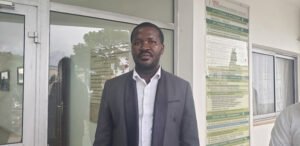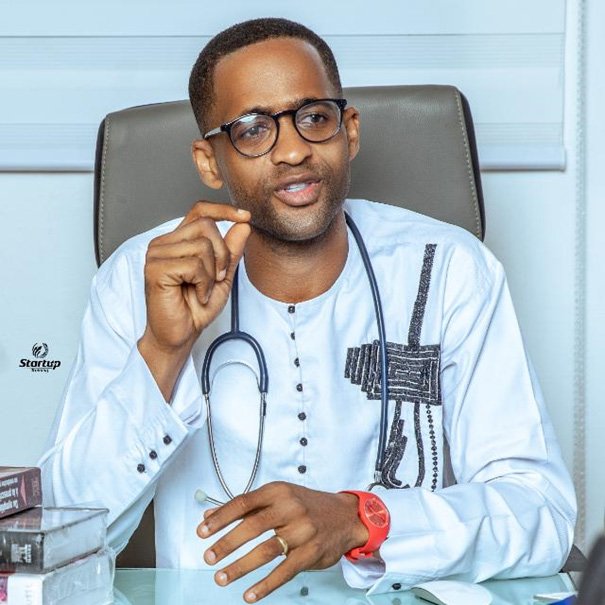“All services of the Bamenda Regional Hospital are functional but we have really serious challenges with personnel.”

Dr. Dennis Nsame Nforniwe, Director General of Bamenda Regional Hospital.
Dr. Dennis Nsame Nforniwe, Director General of Bamenda Regional Hospital.
What is the current state of the Bamenda Regional Hospital with the gradual return to normalcy?
The Bamenda Regional Hospital is the reference hospital of the Northwest region. It went functional in 1956 so it is 68 years old now and it has a capacity of 400 beds. We have a management committee that is presided over by the president of the Regional Assembly, professor Angwafor. This hospital has a staff strength of 565 amongst whom 146 are state employed staff. It is also worth noting that 59 of the staffs are doctors amongst whom 30 a specialist doctors. Now to talk about some departments of the hospital, we have an outpatient department where we carry out on an average 5000 new consultations per month. We have a department of ups and guides where we have 3 gynecologists and we have close to 250 to 300 deliveries every month. The surgical department, where we have 4 main operating theaters with m 12 surgeons. We have about 150 to 200 major surgeries every month and for minor surgeries we have about 400 to 500 every month. The department of internal medicine has two cardiologists, 1 nephrologist and 1 neurologist, 1 gastroenterologist and 1 visiting dermatologist. We admit on an average 1400 patients per month. We have 2 pediatricians and we have over 20,000 doses of vaccines for infant welfare. These are the various services the hospital currently run.
Are all these services operational?
I would say all services of the Bamenda Regional Hospital are functional but we have really serious challenges with personnel. Majority of them are personnel in precarious situations. So here are our needs; specialist doctors including two internist, 2 radiologist, an ear-nose and throat specialist, 1 medical biologist, 1 gastroenterologist, 1 oncologist and 20 general practitioners. We need about 55 to 70 nurses, 14 midwives and 20 laboratory technicians, just to mention these few.
What are the experiences of your personnel working in a conflict zone?
The experiences are really numerous. We have had some personnel that have suffered from abduction. We have people who have been harassed, we have those who have threatening messages. We have to work in the presence of armed men in the hospital at times, when they have a victim admitted. Another challenge is that the staff sometimes need to trek for very long distances to job site, especially on Ghost Town days and some staff need to stay in the hospital for longer days when they are many days of Ghost Town. They have to eat in the hospital canteen during these days.
What are the consequences of this on healthcare delivery?
The consequences on healthcare delivery are also numerous. You will find that we have an increasing amount of unpaid bills; Like in 2023 we had 46 million of unpaid bills. These are all the people that we treated and they could not pay their bills and just for the first quarter of 2024, we already have 12 million of unpaid bills. Those are some of the consequences of the crisis on healthcare delivery and some of these consequences are the decrease number of patients in the hospital. On Ghost Days for example, we cannot have the number of patients we expect to receive. Some patients do not also respect their rendezvous because they cannot meet up when roads are blocked. We also have late arrivals in hospitals. People have to walk for long distances and May be blocked, consequently arriving late. They may also be forced to stay with diseases and only come to consult when it is so critical and it becomes so challenging for the doctor to manage them. Another consequence that we have is the frequent demand for permissions/absence of staff because some staff are in Bamenda but their family or spouses are living out of Bamenda, so they ask for permission to go to visit their families. We have some who have been posted but they have abandoned their job because they don’t want to stay in town. There is the frequent request for a transfer out of town when they are posted. You see the posting decision but the staff never comes. Some have assume duty and they went back to return later, but they have never returned. We have written to the hierarchy to inform them and some staff too do refuse to work at night.
These are some of the consequences of the impacts on the crises on personnel on healthcare delivery.
How does the hospital respond to these challenges?
What the administration has done is to encourage the staff. We also remind the staff during meetings on the importance of humanitarian principles as health professionals. They have to know that humanity is at the top of our care. You have to think about the person first. We are impartial. There is no discrimination, there should be neutrality. When we are health professionals and are working in a crisis zone, we make sure that we are neutral in what is taking place. We also endeavor to have some frank communication with our population.
Any major incidents the hospital has recorded as a result of the crisis?
We have had several of them. Bullets enter into the hospital premises. We have also had a misdirected bullet on the hospital ambulance. We have also had a case of a bomb blast in front of the maternity gate. The noise was so loud that it really affected the patients that were admitted. So those are some major incidents we have recorded as a result of this crisis.
What are some measures you have adopted to ensure the sustainability of the hospital despite these challenges?
The measures we have adopted in the Bamenda Regional Hospital is that of the respect of humanitarian principles. You know we put humanization of care in front. We are neutral. There is also impartiality, no discrimination.. everybody who comes to the hospital is being treated and we also make sure that coverage in the hospital should be 24/7. Doctors and nurses are present at all time and even on Ghost Town days so that any patient that comes is being attended to. And our ambulance services too work 24 /7. They even work more on Ghost Town days because they serve to pick up patients and staff who live far away from the hospital. Staff stay in the hospital for longer days when long periods of Ghost Town are announced. We also reinforce teamwork to ensure sustainability. We receive support and encouragements from our hierarchy. We also collaborate with all the health facilities in town like the Baptist hospital, the Catholic hospital, the Presbyterian hospital and the Bamenda III District hospital. Our collaboration with these hospitals helps us with management and sustainability. There is improved communication among the staff. There is also a lot of communication between the hospital and the community, so that they know the various services and activities we are offering.
What are the majors put in place to ensure the safety of personnel and patients?
Several measures have been put in place! We have recruited hospital guards who guard the hospital day and night. We have also put some surveillance cameras in the hospital at strategic positions and we ensure there is proper dress code. They have their badges for identification. We also have a free telephone number in the various units of the hospital so that the staff can call at any time they need assistance. The hospital administration is available 24/7. We also ensure there is consistent collaboration with the community and the public
Any other challenges ?
We have other challenges like frequent shortage of energy and water in the hospital. We are however very thankful to the city council that has provided the hospital with a borehole that helps us to have water that we provide to the patients and staff. There is insufficient personnel both in quantity and quality. This is a big challenge. Some units need rehabilitation: we have the outpatient department, V.I department, maternity and the new private ward. They are 68 years old and so need some facelift.
What is your greatest achievement since your appointment at the helm of this hospital and do you have any plans for the hospital?
My greatest achievement during my stay in this hospital has been the diagnosis and management of the COVID-19 pandemic. I think the pandemic was a big challenge and I was heading the diagnosis, management and incident response sections. we handled it well and we are happy that the pandemic is over. My short-term goal is to follow up to completion the emergency center project that is being sponsored by the Regional Assembly. The decentralization process has really made it wonderful and the Regional Assembly is sponsoring a very mighty modern emergency center that is on the construction. I’m sure the construction work is already more than 70% done. So we will continue to follow up this project to see that it goes to realization. Another short term goal is to follow up the advocacy for more staff to be posted and to improve on waste management in the hospital. Another short term goal is to improve performance indicators in the hospital by the end of the year 2024. Our long-term goal is to be a center of excellence for adolescent health. We created an adolescent wellness center at the beginning of this year and we want to make it a center of excellence in future. We also want to be a center of excellence for emergency care when this emergency center will be completed and equipped. We will be very happy to be the center of excellence for emergency care and also a center for the management of cancer.
Any message to pass across?
I would say the Regional Hospital of Bamenda is a reference hospital in the region and this hospital is opened 24/7 and we take care of everybody without discrimination. You can call the ambulance number: 67740-1212 any day any time. The message I would like to pass across is that I would like to thank my hierarchy for the continuous support as a regulator to see that Universal Health Coverage grows from strength to strength and that the Regional Hospital of Bamenda is an active actor in the University Health Coverage Project in Cameroon. I can’t forget my devoted staff. I wish to thank them immensely for the team work. Together we are going to keep our dear population healthy. They are really devoted to work in times of crisis.
Can you talk about yourself?
To talk about my humble self, I am Dr. Dennis Nsame Nforniwe. I am a public health doctor with 26 years of work experience. I graduated from the Faculty of Medicine and Biomedical Sciences. My first posting was at the Batibo District Hospital where I worked for seven years. I was later on transferred to the East region where I worked in the Abong Mbang District Hospital. We had a very wonderful development project there that was spearheaded by CERAC. I was very happy after 10 years of work there because we realized the rehabilitation and equipment of the Abong Mbang District Hospital. The minister of Public Health later on promoted me as the director of the Limbe Regional Hospital where I also worked and was very happy that we handled the 2016 female AFCON. I was later on transferred in 2019 as the Director General of the Bamenda Regional Hospital where I am working presently. I would also say that I have an interest in hospital management where I offer consultancy. I have had a scholarship where l have been trained in hospital management by the German government. Thank you very much for this wonderful interview.
Interview by Ingrid Kengne















